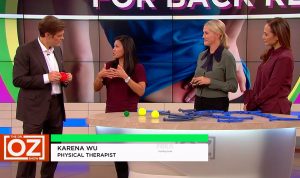 ActiveCare Physical Therapy, PC
ActiveCare Physical Therapy, PC
29 West 38th Street
Suite 601
New York, NY 10018

Sex: An Activity of Daily Living
By Karena Wu, PT and Clinical Director, ActiveCare Physical Therapy

As a physical therapist of 15 years, I have been involved in a lot of educational talks about things to return to in life. These are called activities of daily living (ADL) and they are things that are done on a daily basis by almost everyone. They include activities like dressing, grooming, and self-care. We take into consideration other things like commuting, work-related duties, school-related duties, care-giving and recreational activities. Everyone should be able to participate in all of these activities, ideally pain-free and with no to minimal limitations.
Sex is an activity of daily living. It is a necessary component of life for procreation as well as recreation and stress management. It’s discussed in the news, in media, in the open and in secret conversations. It’s a hot topic and has been around since Adam and Eve. It’s also necessary to discuss it with our patients when they are injured and their partners are asking “when can we…?”
As quoted by Talli Rosenbaum, PT, MSc, AASECT (certified sex therapist) in PT in Motion magazine (April 2015): “Sexual health is an integral component to overall wellness. Sex can be limited by the very domains that physical therapists treat: Engaging in comfortable and enjoyable sexual activity requires the ability to feel, touch, and move.”
It can be uncomfortable to discuss, but we are healers and givers of information, so we need to address the topic. Sometimes we need to discuss the right position to be in for a specific condition, e.g. low back disc herniations. Women should maintain their lumbar lordosis (or extension) in their low back, which means avoiding positions that flex the spine (being on the bottom). The best position for her is rear-entry position (aka “doggie-style”). I know all male partners are now enjoying this piece…
With this same condition, the opposite would hold true for a male. It would be more beneficial for the male to be on the bottom because when the male is on top, the movement during sexual activity increases the flexion moment in the spine.
It’s simple; it’s informative. Address the condition, avoid the aggravating position, suggest an alternative and impart the information. Your patient and their partner will thank you for it as they get back to their enjoyable ADL’s!
To learn more, call ActiveCare Physical Therapy at (212) 777-4374 or visit www.activecarephysicaltherapy.com.
